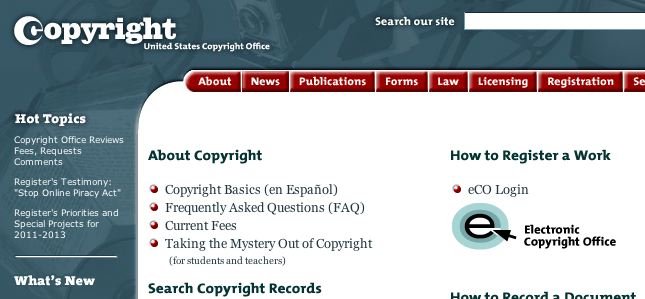5 Misconceptions Sites/Hosts Have About the DMCA
 For websites and hosts that accept content from third parties, the Digital Millennium Copyright Act (DMCA) has been a boon. Prior to the DMCA and its safe habor provisions, there were many questions about what liability hosts would have when their users/customers took advantage of their servers to infringe copyright. The DMCA answered those questions, the best it could at the time at least, and set forth guidelines on how hosts could avoid liability for infringement by users.
For websites and hosts that accept content from third parties, the Digital Millennium Copyright Act (DMCA) has been a boon. Prior to the DMCA and its safe habor provisions, there were many questions about what liability hosts would have when their users/customers took advantage of their servers to infringe copyright. The DMCA answered those questions, the best it could at the time at least, and set forth guidelines on how hosts could avoid liability for infringement by users.
Without the DMCA, many of the sites we love and enjoy probably couldn’t exist. Sites like YouTube, Facebook, Tumblr and so forth could not exist without the protections of the DMCA as the potential liability risk would simply be too great and there would be no effective means of enforcement.
Copyright holders also gained in the transaction, getting a fast, effective and cost-efficient way to get infringing material removed online. Even though there are occasional abuses of the DMCA process, overall, it works very well and both sides seem to be mostly happy with it.
Still, this doesn’t mean that there aren’t mistakes and errors. Many times its the filers that are making the mistakes but, often times hosts get it wrong as well.
With that in mind, here are five of the more common mistakes that hosts make when dealing with the DMCA and how to fix them.
1. The DMCA Protects Everything On Your Site
The DMCA is a specific law in that it protects you from liability from infringements by third parties. This means that if a visitor uploads content to your server, the law can protect you. This includes things like comments, posts on a forum, files you host for third parties and even whole sites run by others on your servers.
However, the DMCA can not protect you from content that you upload yourself. While the DMCA can protect you if a visitor uploads a copyright infringing comment to your post, it can’t help you if that same post uses an infringing image that you put there.
This is primarily why the DMCA is used by forum admins, social networks, user-generated content sites and web hosts that get the bulk of their content from third parties.
2. It’s As Simple As Removing Content When Notified
While removing content when notified of infringement is important, it’s not the only thing that the law requires.
First, the law requires that you not have any knowledge of the infringement, while you aren’t required under the law to actively search out infringements, if you do become aware of one, it’s usually best to remove it. The bar for this type of liability is still very high but could, at least theoretically, apply.
However, the more common issue is that the law does require you to designate an agent to receive such requests. This designation needs to be made both on your site and with the U.S. Copyright Office (USCO).
The latter is what is more difficult, requiring you fill out the form from the USCO and submit it along with the payment.
Though it will cost you at least $105 to protect yourself, it’s a lot cheaper than dealing with a lawsuit down the road.
3. The DMCA Is International
The DMCA is an American law so hosts and providers in other countries aren’t protected by it. However, other nations have implemented similar systems including, most notably, the European Union.
But despite the common nature of similar rules, the execution of the safe harbor guidelines vary wildly from country to country so take a moment and learn your nation’s laws before moving forward. However, many hosts do accept DMCA-formatted notices as they have become something of a de facto standard for notices across the world.
4. As Long as I Follow the DMCA, I’m Immune
While the DMCA is a powerful tool in that it helps eliminate a great deal of potential liability in this area, it doesn’t take all of it away.
For example, if you run a site or a service and are found to be taking steps to induce people to commit copyright infringement, such as rewarding infringement or promoting it as a tool for infringement, you could be held liable under the inducement test established by Grokster.
Also, it’s worth reiterating that you are not allowed to be aware of the infringement and you are not allowed to profit from the infringement directly when you have the ability to control it, as per the DMCA itself.
In short, there are still many legal avenues in which a site or service using the DMCA in bad faith can still be held liable.
5. No Notices Without Handwritten Signatures
Finally, some hosts require that you submit a DMCA notice either via fax or email saying that the law requires them to have a physical signature to be able to process the notice.
First, this doesn’t eliminate the use of email to send PDFs, but more importantly, it doesn’t coincide with what was in the law itself. In the requirements for a DMCA notice, the law clearly states (PDF) that the filer needs to only provide
“A physical or electronic signature” and the Electronic Signatures in Global and National Commerce Act (ESIGN) of 2000 defines an electronic signature as “An electronic sound, symbol, or process, attached to or logically associated with a contract or other record and executed or adopted by a person with the intent to sign the record.”
The electronic siguature then has to do just two things:
(A) identifies and authenticates a particular person as the source of the electronic message; and
(B) indicates such person’s approval of the information contained in the electronic message.
In short, an electronic signature can be almost anything as long as it identifies the person who is signing it and indicates their agreement or approval. Every time you agree to a terms of service on a site, you “sign” the document in a legally-binding way with just a mouse click. Many hosts accept electronic signatures on their own TOS, but not when accepting DMCAs, a move more likely out of limiting the number of people who file than complying with the law.
Bottom Line
No system ever created by human beings has been perfect and the DMCA notice and takedown system is no different. It is far from ideal and has many flaws to be found with it. That being said, despite early criticism and fears that it would destroy the Web, it’s worked out fairly well, with minimal actual abuse of the law (and most such cases being corrected easily).
Likewise, most hosts handle the law reasonably well and have pretty good policies in place to receive, process and respond to DMCA notices. As with the filers, most mistakes are innocent and don’t have a major effect on the outcome.
Still, there’s always room for improvement and, hopefully, by clearing up these misconceptions some of that improvement can begin sooner rather than later.
Next week, however, it will be the filer’s turn for a similar article, so stay tuned.
Server Room Photo Credit: BigStockPhoto.com
Want to Reuse or Republish this Content?
If you want to feature this article in your site, classroom or elsewhere, just let us know! We usually grant permission within 24 hours.
